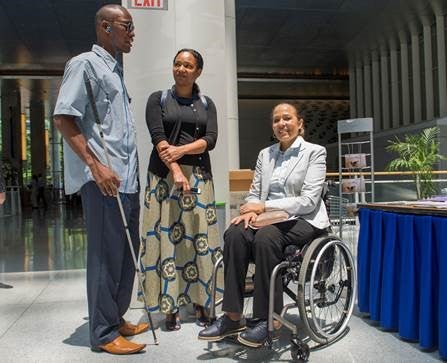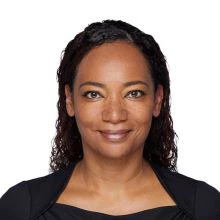
From left-right: Leroy Philips, Yaa Oppong and Charlotte McClain-Nhlapo
(Photo: Brandon Payne / World Bank)
Last fall, while supporting the preparation of a World Bank-financed education project in Guyana, and exploring entry points for gender and disability inclusion (with Braille business cards in hand), I met Mr. Leroy Phillips at the Guyana Society for the Blind (GSB). Leroy introduced himself after stepping into my meeting room to collect his cane.
I learned that Mr. Phillips was a youth leader, disability rights advocate, student of communications and freelance radio broadcaster from Georgetown with a weekly disability-themed program Reach out and Touch. Leroy has also been invited to speak internationally, earning accolades for his work for children with disabilities, including the inaugural Queens’ Young Leaders Award 2015.
Leroy graciously shared the story of his childhood challenges, having suddenly and inexplicably lost his sight at the age of 6. In the first ever edition of the Bank’s internal newsletter on disability, he also offered advice on how projects should consider the needs of young persons with disabilities.
“It is always my pleasure to inform people about my life experiences as a child and my early years of blindness,” he says, “I think the more you tell a story, the more people are enlightened about your situation. As such, I can help to shape a brighter future for other young people in similar circumstances.”
Excluded
As a young child, Leroy found himself excluded from many basic experiences.
“I can recall (that when I was about) age six or seven, my uncle used to teach the young folks in the family except me. … I couldn’t understand why I wasn’t included when he would gather all the young kids to do their spelling, reading, tables and other math related exercises,” Leroy says.
He notes that society’s expectations of young Persons with Disabilities (PWD) were low or non-existent and that discrimination was the norm.
He says: “In the Caribbean, people take you for granted. They think that because you have a disability that it is the end of the world for you and that you are not capable of anything. Being blind, I was denied an opportunity to participate equally in education lessons at home or at school.”
From the margins to the middle
How could a child who had been excluded and discriminated against by family, friends, and society and placed (sometimes literally) by these same actors at the margins not only navigate his way to the center but also humbly and patiently teach and lead those who once excluded him?
When he was 15-years-old, Leroy was invited to play cricket by a few of his blind school mates. He was skeptical at first and resisted, thinking that he was being lied to since he had never heard of any blind-friendly sports. He was eventually persuaded to participate and has never looked back. He, in fact, represented the West Indies in the Blind Cricket World Cup this year in India.
Leroy says: “Blind cricket became the vehicle to a new life. It transported me and offered me the privilege to engage meaningfully in programs that had previously been denied me. It provided opportunities to speak and perform nationally and internationally while representing the group I feel powerfully for;
“I believe the tool to my success in blind cricket came in the form of people…older guys who indirectly passed on their experiences of being blind during youth, they taught me how to combat societal barriers and urged me to be resilient;
“There was no doubt that I lacked one of the main qualities of anyone’s life, confidence; perhaps even hope. With the confidence cricket provided, I matured and found myself developing and became bold and out-going, and opportunities began to flow my way like a river. That’s when I gained access to academic advancement opportunities.”
Second Chance
Having “truly lost out on a massive amount of education from age six or seven”, at the age of 23, Leroy was provided with a second chance in the form of a collaboration between the Ministry of Education and the GSB. The partnership supported small cohorts of blind and visually-impaired students (who had been sidelined in school) in completing high school exams. Having recently earned his Diploma in Communications at the University of Guyana, Leroy has plans to eventually pursue a Masters’ degree abroad.
A second lucky break came in the form of an invitation to participate in a broadcasting internship at the National Communications Network. Of the 150 youth who began the 6 months long pilot, only Leroy remained at the end, and he works there today as a radio broadcaster.
Becoming a leader
Today Leroy’s leadership accomplishments include: Program Relations Officer (PRO) and President for Leonard Cheshire Disability Young Voices, Guyana; PRO for Prevention of Teenage Suicide, (a country with one of the highest youth suicide rates in the world); as well as the Guyana Blind Cricket Association. He recently spearheaded the formation of a “Youth Arm” at the GSB and was elected its temporary Chairman. This year, Leroy joined the National Commission on Disability (NCD) ‘s volunteers tasked with raising national awareness on the Disability Act of 2010.
Leroy explains that he was elected to these positions, “because of my talking abilities and high-spirited attitude. I think of myself of an express train, always on the go. I refuse to be seen in the lesser light of society and aim to be a trail-blazer,”
He adds: “Leaders must be reminded of their goals/dreams and constantly employ smart methods/mechanisms to accomplish success. … I have no plan to stop feeling hopeful and to quit searching and praying. Once there is life, there is hope, and I will forever entertain this motto. “
The future
With the mentorship, friendships, opportunities, confidence and hope gained through education and cricket, one young person has tenaciously seized opportunities. He is shaking off society’s preconceptions of his dis/abilities and (in the words of his email signature block) is a: “humble youth, changing the world from my corner”.



Join the Conversation